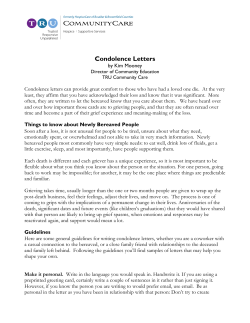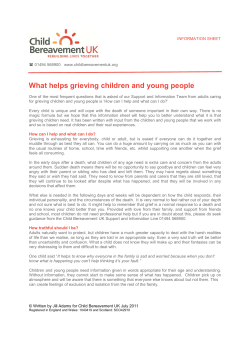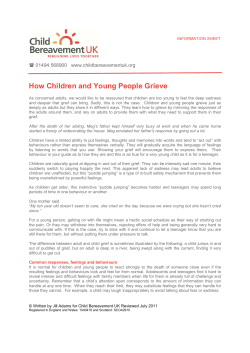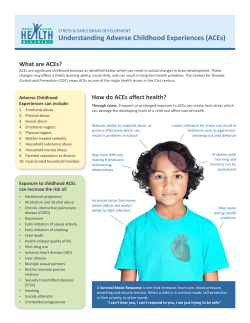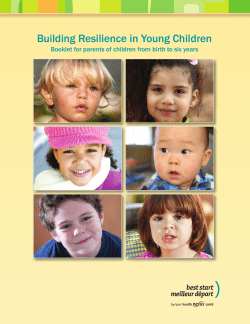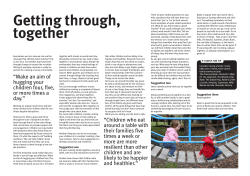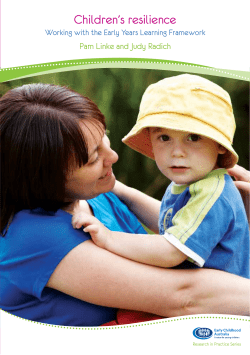
T
love and death 301 LOVE AND DEATH T he Ecclesiast, purveyor of dyspeptic wisdom, reflects on the misfortunes of the dead: “The dead know nothing; they have no more reward and even the memory of them is lost” (9:5). If at least the memory lingered on—that would be something. But the Ecclesiast uncharacteristically misses an opportunity to rub it in, for it can actually seem much worse: it is not just that we are forgotten in the vast eternities of time, it is that even those we love1 and who love us the most display an astonishing facility for “moving on,” for adapting to their loss and so avoiding significant distress over our demise. Moreover, wives and husbands remarry, often at depressingly brief intervals, further diminishing the significance of the loss to them; we retain photographs and other trinkets of remembrance, but all of the emotions that were once insurmountable barriers to similar relationships with others are irrecoverably lost. All of this occurs because of adaptive processes that may be in the self-interest of the survivor since they facilitate a rapid return to a healthy emotional baseline, but they involve profound reasons for regret as well, both because of what these processes say about the bereaved and, more generally, what they say about the significance of our relationships with one another. At least, that is one interpretation of love and death. I find this gloomy view both compelling and depressing, and it is worth expounding it in more detail for the light it sheds on our lives and our deaths. i How do spouses or partners in a long-term, committed relationship react when the person they love dies? In answering this question, we may be tempted to form an estimate by focusing on what we imagine we might feel immediately after hearing the news that our husband or wife had died. But this and other armchair estimates of emotional responses are notoriously unreliable, and fortunately there exists a large empirical literature on the psychology of bereavement that can serve as a fixed point. The most important finding of this body of work is summarized by a leading researcher: [M]any, and sometimes the majority, of bereaved individuals exhibit only short-lived grief-reactions and a relatively rapid return to baseline 1 The focus here will be on “romantic” love, though much of what I say applies to other forms as well. 0022-362X/07/0406/301–16 ª 2007 The Journal of Philosophy, Inc. 302 the journal of philosophy functioning…. Bereavement theorists have tended to assume that the normative responses to loss involve either chronic suffering or gradual recovery lasting at least several years; the relative absence of distress during bereavement is thought be both rare and psychopathological…. [But] recent research has provided a strong challenge to these views: The relative absence of grief symptoms and the continued ability to function adequately following the death of a close relation do not appear to reflect denial or pathology but rather an inherent and adaptive resilience in the face of loss.2 The results of empirical investigation thus seem to conflict with a widely held view in our culture that the loss of a partner or spouse is invariably or at least usually an agonizing blow with long-lasting and significant impact. Contrary to this folk view (and certain nonempirical bereavement theories), empirical research seems to show that most people manifest what the author above refers to as resilience in the face of loss: although they are initially traumatized, they quickly recover and manifest little long-term distress. And, again contrary to folk wisdom, this does not seem to be the result of repression or of having had an unfulfilling relationship; most people simply adapt far better to their loss than we tend to believe. Nor is this finding at all unusual; indeed, it represents the consensus of nearly all of the empirical research dedicated to testing how people actually react to the loss of a spouse. The author cites another study in which nearly half of the participants did not show even mild depression following a spousal loss.3 Another researcher who carried out a long-term investigation reports that, compared to a control group, “The effect of bereavement on symptoms of depression and general psychopathology…was significant only at 2 months following loss.”4 Still another expert sums up his work, “A general conclusion of this study is that the death of a spouse in later life does impact the surviving spouse’s subjective well-being but not to the extent that many would expect.”5 If these results are surprising, it gets stranger still: research indicates that not only do half or more of bereaved spouses 2 G. Bonanno et al., “Resilience to Loss in Bereaved Spouses, Bereaved Parents, and Bereaved Gay Men,” The Journal of Personality and Social Psychology, lxxxviii (2005): 827–43; quoted from p. 827, citations omitted. 3 The study is S. Zisook et al., “The Many Faces of Depression Following Spousal Bereavement,” Journal of Affective Disorders, xlv (1997): 85–94. 4 A. Futterman, J. Peterson, and M. Gilewski, “The Effects of Late-Life Spousal Bereavement over a 30-Month Interval,” Psychology and Aging, vi (1991): 434–41, on p. 438. 5 Dale Lund, “Impact of Spousal Bereavement on the Subjective Well-Being of Older Adults,” in Lund et al., eds., Older Bereaved Spouses (New York: Hemisphere, 1989), pp. 3– 15, on p. 12; cited in Jeremy Blumenthal, “Law and the Emotions: The Problems of Affective Forecasting,” Indiana Law Journal, lxxx (2004): 1–95. love and death 303 tend to be resilient or muted in their reaction to their loss, but a consistent 10% or so of the bereaved experience a dramatic increase in subjective well-being following the loss.6 And prospective studies that allow the tracking of well-being before as well as after a loss reveal that a large proportion of those who do report being deeply unhappy several months after their loss were deeply unhappy before the loss as well; in other words, it is unclear that their distress is caused by their loss rather than standing features of personality or circumstance.7 Moreover, with some minor differences these results appear to apply cross-culturally.8 Finally, given this muted reaction, it is no surprise that the bereaved often find it fairly easy to remarry within a fairly short period of time. Although there are somewhat different figures given in the literature, owing perhaps to different investigative methods, it is clear that those who are young and therefore find it relatively easy to secure new partners remarry quite soon after their loss.9 And of course we must bear in mind that even among the elderly who remarry far less often, the desire to remarry or date is much higher than the actual rate, both for generic reasons and because of an increasing gender imbalance with age increase.10 It is important to concede the other side of the story and not to exaggerate these findings, summarized in extreme brevity just now. Obviously a large number of people in absolute terms are completely devastated by their loss, and some never recover. Loss of a spouse is in fact associated with a sharp rise in risk of death, especially shortly after the loss, indicating that the consequences are anything but trivial.11 6 Bonanno, R. Nesse, and C. Wortman, “Prospective Patterns of Resilience and Maladjustment during Widowhood,” Psychology and Aging, xix (2004): 260–71. 7 Bonanno et al., “Resilience to Loss and Chronic Grief: A Prospective Study from Preloss to 18 Months,” The Journal of Personality and Social Psychology, lxxxiii (2002): 1150–64. 8 Bonanno et al., “Grief Processing and Deliberate Grief Avoidance: A Prospective Comparison of Bereaved Spouses and Parents in the United States and the People’s Republic of China,” Journal of Consulting and Clinical Psychology, lxxiii (2005): 86–98. 9 The median interval for remarriage among whites is 1.7 years for men and 3.5 for women. About 90% of white widows under 45 remarry, with a similar pattern holding for women as well until the mid 30s, at which point there is a steep drop-off in probability of remarriage. Interestingly, these figures are respectively higher and lower among blacks. See W. Cleveland and D. Gianturco, “Remarriage Probability after Widowhood,” Journal of Gerontology, xxxi (1976): 99–103. Naturally, remarriage looks very different among the aged. For a recent study, see K. Smith, C. Zick, and G. Duncan, “Remarriage Patterns among Recent Widows and Widowers,” Demographics, xxviii (1991): 361–74. 10 D. Carr, “The Desire to Date and Remarry among Older Widows and Widowers,” The Journal of Marriage and Family, lxvi (2004): 1051–68. 11 N. Christakis and P. Allison, “Mortality after the Hospitalization of a Spouse,” New England Journal of Medicine, cccliv (2006): 719–30. It is important to note that the 304 the journal of philosophy Even when subjects report relatively little psychic trauma, they do sometimes report grieving for a substantial length of time, though this reported grieving appears to have little connection with measures of happiness or subjective well-being (and thus does not correspond, perhaps, to grief in the way it is usually understood).12 Nevertheless, the cumulative evidence seems to show quite clearly that most people do not experience significant long-term distress when they lose the person they have committed their lives to. It is important to note, also, that the investigations cited for the most part rely on self-reports of grief, either in response to in-person interviews or more usually responses to paper-and-pencil surveys. The direction of exaggeration is thus very likely to be in the direction of overreporting grief and distress since this is what we culturally expect of those experiencing such a loss. In fact, this expectation is so strong that increased grief display is positively correlated with likeability ratings.13 Like all empirical findings, these results are subject to revision and refutation. I will assume that they are roughly accurate, but even if they turn out not to be, if we like we can simply stipulate that the discussion applies to the (majority) group whose reaction to the loss ranges from muted or resilient to ebullient. This provides a certain immunity to future revision, since presumably only the size but not the existence of this group is likely to be challenged. In any case, later on I will try and show that these empirical findings, while useful for motivating the discussion, are not essential to my claims. ii Some may find these results encouraging and only encouraging: a large class of people whose lives we thought were shattered by a major loss turn out to be affected only to a fairly low degree. There is less misery in the world than we thought. If this response is unadulterated by qualms or hedges, it may be rooted in a general view about how to evaluate reactions to losses: the best reaction to a loss is the one that most promotes the interests of the one suffering the loss. Call this the Adaptive Theory. This theory may in turn find some support in a still subjects of this study were quite old—the average age was over 70—and also that the same effect was observed in nonlethal hospitalizations. For example, the spousal risk to men whose wives have been hospitalized with a hip injury is comparable to the risk associated with a wife’s death, especially after the first few months. This indicates that what is at issue is probably not extreme grief or depression but more mundane problems arising from interdependence. 12 Bonanno et al., “Resilience to Loss in Bereaved Spouses.” 13 Bonanno et al., “Resilience to Loss in Bereaved Spouses.” love and death 305 more general conception of human behavior—one that says that the way to evaluate the rationality of any human activity is in terms of its propensity to promote the person’s interests. (The self-interest theory of rationality is one manifestation of this normative attitude toward behavior.14) Since many people suppose that unpleasant experiences of grief and psychological distress are contrary to our interests, they might infer from the Adaptive Theory that the response most people actually seem to have is close to the best response; in failing to be significantly distressed, the bereaved are coping in a near-maximally adaptive fashion. Since the evidence indicates that there is no penalty to be paid for failing to suffer from a loss, the best response to grief may thus seem to be little or none at all. However, many people are not only surprised but shocked and dismayed by these results, as the tendency toward greater dislike for those who display comparatively little grief brings out. Why is that? What is it that might make us uncomfortable about resilience? One reason we should consider is that insufficient grief following a loss may indicate that the one suffering the loss never valued the object sufficiently in the first place. We may imagine dying and infer from the subjunctive truth that those we love would probably not be deeply affected by our absence that we are not valued very highly even now. To the extent that responses to losses and valuing of the thing lost go together, it can seem tempting to move from disappointment with the one to suspicion about the other. If this were right, we would need to think harder about the use of “best” in the Adaptive Theory. Perhaps resilience is best for promoting the person’s own self-interest, but that may only show that in this domain, as in so many others, there are considerations counting against having the attitudes that best promote our interests. There is, however, a powerful objection to this line of thought. For what is true of reactions to the loss of a spouse turns out to be true of our reactions to other major losses as well. We are systematically mistaken in what is sometime called our “affective forecasting”:15 what we imagine to be catastrophes for us routinely turn out to be only minor blips that we quickly overcome. Being denied tenure, for instance, has very little effect on long-term happiness.16 Contrary to what most 14 See Derek Parfit’s Reasons and Persons (New York: Oxford, 1984) for an extended discussion and critique of the self-interest theory. 15 See the account and further references given in D. Gilbert and J. Ebert, “Decisions and Revisions: The Affective Forecasting of Changeable Outcomes,” Journal of Personality and Social Psychology, lxxxii (2002): 503–14. 16 D. Gilbert et al., “Immune Neglect: A Source of Durability Bias in Affective Forecasting,” The Journal of Personality and Social Psychology, lxxv (1998): 617–38. 306 the journal of philosophy academics imagine, whether or not they are denied tenure is unlikely to make much of a difference in their subjective well-being after an initial and short-lived dip. Similarly, dissolving a romantic relationship, losing a child,17 sustaining a debilitating spinal-chord injury,18 or other major medical problems19 may produce differences compared to control groups, but these are often surprisingly small and tend to diminish or even disappear after a short while. (Conversely, we are also wrong about things like gaining tenure or winning the lottery, which tend not to produce as much happiness as we predict.) The reasons for these rapid recoveries are not fully understood and seem to be heterogeneous.20 However, some of the mechanisms at work are fairly obvious, particularly various contrast effects. Recent improvements or declines in well-being contrast with still-vivid memories of previous states and affect us strongly, but after a short while this contrast effect wears off and we get used to what we now regard as the new baseline. Also, sudden changes can reduce the significance of previously important-seeming events, so that, say, simple pleasures like going to the movies suddenly seem less exciting once we have won the lottery. For these and other sorts of reasons, it appears to be difficult permanently to raise or lower people’s levels of happiness provided there are not continual “shocks,” and provided a certain threshold has been reached. This view is supported by the finding that, when it comes to events (as opposed to persistent states, like being clinically depressed), almost nothing that happens to us has a significant impact on happiness beyond three months or so.21 What this shows is that even when it comes to paradigm cases of things we care very deeply about (for example, our spinal chords) our reaction to loss is muted and far less than we tend to imagine it would be. This seems to suggest that we cannot explain dissatisfaction with resilience to the loss of a spouse by claiming that resilience indicates apathy. Moreover, these findings imply that any plausible attack on the Adaptive Theory must account for the fact that our reactions to 17 Bonanno et al., “Resilience to Loss in Bereaved Spouses.” P. Brickman, D. Coates, and R. Janoff-Bulman, “Lottery Winners and Accident Victims: Is Happiness Relative?” The Journal of Personality and Social Psychology, xxxvi (1978): 917–27. 19 For an important study and further references, see J. Riis et al., “Ignorance of Hedonic Adaptation to Hemodialysis,” Journal of Experimental Psychology: General, cxxxiv, 1 (2005): 3–9. 20 Bonanno, “Resilience in the Face of Potential Trauma,” Current Directions in Psychological Science, xiv, 3 (2005): 135–38. 21 E. Suh, E. Diener, and F. Fujita, “Events and Subjective Well-Being: Only Recent Events Matter,” The Journal of Personality and Social Psychology, lxx (1996): 1091–102. 18 love and death 307 bereavement form part of a general pattern of resilience toward even extreme and disastrous changes. The Adaptive Theorist can now point out that resilience to losing those we love is part of a disposition that plays a deep and systematic role in making us the kinds of creatures that can overcome the frequent and inevitable setbacks that we must suffer over a lifetime. Of course, the point about our not caring enough about what we lose could be broadened to take this larger pattern into account. An embittered cynic might say, “I used to think that reactions to the loss of a spouse were especially objectionable. These new facts show that not to be the case. But now things are worse. Apparently we do not care very much about anything. The facts about our reactions to losses show that evolution has endowed us with a deplorably superficial capacity for valuing things in general. My sorrow at learning that lovers don’t care enough about each other to be significantly distressed by the loss of the other isn’t mitigated by learning that they don’t care that much about their spinal chords either.” This extreme position might be buttressed by claiming that part of what it is to care deeply about something is to be disposed to suffer deeply following losses: “A person who cares about something is, as it were, invested in it. He identifies himself with what he cares about in the sense that he makes himself vulnerable to losses.”22 If we prove invulnerable or insufficiently vulnerable, that may ground suspicion that we did not deeply care to begin with. To put it another way, facts about caring have conditional implications involving responses to losses, and we can reason from the failure of these conditionals to be satisfied to the absence of concern. This may be reflected, for instance, in the difficulty we have in accepting statements like this: “You are the love and light of my life; but naturally, were you to die, it would have little significant impact on me beyond a few months, and I would probably fall in love with someone else shortly thereafter.”23 Apart from being implausibly extreme in implying that none of us cares about much of anything, this view overlooks the massive evidence that we do care deeply about people before they die. This concern is manifested in our willingness to make sacrifices for them, our pain in the face of even their minor misfortunes, and our general disposition to protect and advance the interests of those we love. The extreme view also overlooks different reasons for failing to be devas22 Harry Frankfurt, “The Importance of What We Care About,” in The Importance of What We Care About (New York: Cambridge, 1988), pp. 80–94, on p. 83. 23 Since I go on to rebut this view on other grounds, I will not tarry over the possibility that the inconsistency involves mere conversational pragmatics. 308 the journal of philosophy tated by loss, only one of which is failing to care about something to begin with. Take denial of tenure. The reason people are so wrong about their predicted response to this event is not that they care less about tenure than they think, but rather that they overlook the elaborate psychological apparatus we possess for dealing with such events.24 After their initial horror, unfortunate junior professors soon begin to rationalize their failure by appealing to baroque conspiracy theories, departmental politics, and so on (never the inadequacy of their work), and within a few months the contrast between a lousy present and better immediate past is lost in any case. Given the prima facie evidence in favor of the antecedent high concern for tenure, the best explanation for lack of distress over denial of tenure is thus likely to be the engaging of various adaptive mechanisms, not a prior absence of concern. Although the bereaved are different to the extent that rationalization and other coping mechanisms of junior professors probably do not apply to them, they too can say that their lack of distress merely indicates that concern for a person or object can be severed from distress over its loss by adaptive mechanisms. It is these mechanisms that explain how someone could be willing to risk her life for her husband while failing to be significantly traumatized by his death. It just turns out to be a remarkable trait of our species that caring very deeply about someone is compatible with a strongly muted reaction to their death. Friends of the Adaptive Theory can thus not only claim that our response to loss is best, but that so far no ground for genuine ill-ease with that response has been located. The extreme response is a dead end; resilience is evidence of a post-factum ability to adapt to loss, not an antecedent lack of concern. Nonetheless, there is something right about the extreme response. Resilience does tell us something important and distressing about our relationships with those we love, even if the precise feature at issue has been misidentified by the extremist. One source of anxiety concerning our adaptive capabilities lies, I believe, in what they imply about our importance for those we love. The problem is that because our deaths make a comparatively minor impact on their lives, we may feel forced to conclude that we do not possess the kind of importance for them that we thought we had. The notion of “importance” that is relevant here, or what we might in some contexts call “significance” or “value” notwithstanding subtle differences between the three, is a hard one to pin down, but a few simple examples will make clear what 24 That is, we neglect our “affective immune system.” See Gilbert et al., “Immune Neglect.” love and death 309 is at issue. Our importance to an organization like a baseball team or Congress is great when we make an enormous difference to its operations, when our absence wreaks havoc, and when we are unique and irreplaceable in what we do. Conversely, claims of importance or significance are inflated when it turns out that nothing we do really matters or that a year’s leave of absence would go unnoticed and we could be easily replaced. Similarly, in the personal sphere we need and therefore value relationships with some people more than others. Friends who add greatly to our lives seem important to us, while the pizza delivery boy is insignificant to us since he does not do anything we need all that much and even the little he does is easily done by someone else. (As this example shows, the insignificance of something for us—relative to certain aims and preferences—need not imply anything about the value of the object as such. Nothing I say here is incompatible with the infinite Kantian worth of rational pizza boys.) An important feature of importance is thus that the concept has a counterfactual dimension; my supposed importance to a baseball team can be undercut by what happens after I leave it. It is for this reason that worries about our significance in the face of resilience cannot be quelled by the point made earlier against the extremist: evidence that we care for our lovers while they live is not undermined by facts about what happens after they die, but the same is not true of importance. A muted response to our death is relevant to our importance while we still live, since counterfactuals in part determine the importance or value of something. We like to believe that we are needed by our husband or wife and that consequently losing us should have a profound and lasting effect on them, just as the sudden injury of a key baseball player should have a disruptive and debilitating effect on the team. Most of us tend to assume that our relationship with the ones we love is so important to them that severing that relationship would make a deep impact on their ability to continue to lead happy worthwhile lives. The fact that our beliefs about these matters are false and that our loved ones are resilient to the loss of us seems to show that we do not have the significance that we thought we did. We can explain what is distressing about the high probability of and brief interval before remarriage along similar lines. Not being needed is one way to fail to be important, but of course not the only way, since even people performing essential functions can be replaced, and fungibility is antithetical to importance or value. (That is part of the reason for the well-known tendency of leaders such as founders of businesses or Roman emperors to fail to institute succession plans: the existence of such a plan immediately reduces the leader’s own importance.) Of course, it would be not only crass but inaccurate to think of remarriage 310 the journal of philosophy as replacing the deceased in toto. Both people and the specific contours of their relationships are unique and will never be wholly mimicked by successor-relationships. But the same is true of baseball players and Congressmen: a team will function somewhat differently once it loses a wily southpaw, and Congress will never be quite the same without Preston Brooks and his cane. The reason the operations of these organizations are not substantially impeded by such losses is that the differences that matter to organizations are determined by their overall goals and functioning (winning ball games and legislating effectively), and these are not much affected by mere idiosyncrasies. Contrary to the suggestion made earlier, at least some spouses and lovers may need us very much. But the tendency toward remarriage combined with the comparatively low rates of distress among the bereaved suggest that the ways in which we are needed are functional rather than idiosyncratic; we play an important role in the lives of those we love, but not a role that others cannot with relative ease fill once we are gone, since our unique traits do make much of a difference to our success in those roles. We may be desperately needed as companions, friends, sex partners and intimates, but these roles endow us with much less significance than we imagine, given that we can be functionally replaced in these respects, and—so the evidence indicates—upon our deaths very often are. This is not to say that those who remarry do not have a special place in their heart for their previous spouse that will never be touched by his or her successor; it is only to explain why the adaptive responses of those we love can give us reason for regret, since they seem to show that we do not have the importance for our husbands and wives that we thought. But it is not only those contemplating their own demise and the lack of impact that event will have on those they love who have reason to be uneasy about resilience; for despite the obvious advantages the Adaptive Theory draws our attention to, even those who have lost their spouse, and so directly benefit from adaptation, may have reason to regret the benefits resilience confers. Our “emotional immune system,” while promoting our interests by allowing us to continue functioning in the face of trauma, also renders us unable to take in and register fully the significance of our losses. Part of what being the vulnerable creatures of flesh and blood that we are means is that we are subject to staggering losses in the form of the deaths of those we love, and yet our reaction to those losses is utterly incommensurate with their value, especially after the first month or two have passed. The good of a happy relationship with a lover is one that we value more highly than almost any other, and yet when we lose that good, our response over time does not seem to reflect its preciousness to us. love and death 311 Resilience thus seems to deprive us of our ability to care about those we love to their full measure after they are gone, and so deprives us of insight into our own condition. This claim may seem peculiar. Assuming we are not in some pathological state of denial and are thus in possession of the appropriate beliefs, how can we possibly fail to register our losses? The answer to this lies in the difference between the superficial discrimination of some fact and what we sometimes describe by saying that someone has really “absorbed” or “taken in” something—a difference that typically involves having certain emotions in connection with what has been registered. Explaining what exactly the relationship between having emotional responses is to digesting fully various goods and bads that befall us is admittedly difficult, since on reflection it is far from clear why there should be an affective component to processing certain experiences. Why need feelings accompany the purely cognitive processes of discrimination in order for us to believe that someone has really “gotten it” when, say, she gets word of a death or an amputation or a (welcome) marriage proposal? Perhaps part of it is that emotions sometimes seem to have a role analogous to sense organs for us: the emotions are part of the means by which we perceive value.25 Of course, emotions also do other things, and cognitive processes like practical reasoning can play a role in perceiving value as well, but it is nonetheless hard to envision someone being fully capable of recognizing a good or a bad without the appropriate emotional responses. In fact, there is powerful empirical evidence to suggest that without emotional responses we find it so difficult to recognize value that we cannot make even elementary decisions that require us to see one option as better than another.26 Similarly, psychopaths seem unable to grasp the moral significance of their victims despite possessing normal cognitive abilities, and the best evidence is that this is due 25 Some will want to follow Hume in saying that the emotions are the means by which we project value (for example, second Enquiry, Appendix I). But Humeans can and should lament the inability to project in roughly the same way anti-Humeans lament the inability to perceive value; it is not as if Humeans are less appalled by those afflicted with affective disorders which prevent them from reacting to important changes in wellbeing. Their explanation will simply take a different form. For discussion, see Simon Blackburn’s Ruling Passions (New York: Oxford, 1998), especially chapter 9. For a defense of the view that emotions can represent things like losses and that emotions involve perceptions of our relation to the world, see Jesse Prinz, Gut Reactions: A Perceptual Theory of Emotion (New York: Oxford, 2004), chapters 3 (especially pp. 60–66) and 10. Prinz also defends the assumption I make here that emotions involve feelings and are not purely cognitive. 26 For instance, subjects with affective disorders often fail at certain games of chance because they do not see bad outcomes as bad anymore. See Antonio Damasio, Descartes’ Error (NewYork: Avon, 1994), especially chapters 3 and 9. 312 the journal of philosophy to their inability to experience certain emotions.27 Those with affective disorders thus seem unable to grasp whether certain things really matter. If these remarks are on track, then our adaptive but muted responses prevent us from forming a correct picture of how things really are, value-wise. In a sense, resilience is a form of benign—or at least adaptive—blindness.28 But even if this were right, it may not seem obvious that such a blindness or inability fully to comprehend the loss of a good is a bad thing. The loss itself is one bad, and experiencing intense psychological distress in response to it simply adds a second; how can suffering one but not the second bad be worse than suffering both? The oddity comes out especially well in Proust’s statement of the view I am defending: Our dread of a future in which we must forego the sight of faces and the sound of voices which we love and from which today we derive our dearest joy, this dread, far from being dissipated, is intensified, if to the pain of such a privation we feel that there will be added what seems to us now in anticipation more painful still: not to feel it as a pain at all—to remain indifferent.29 We can explicate the feeling Proust refers to by noting that failing to recognize how great a good we have irretrievably lost means that we are to some extent deluded about our own condition. That seems undesirable for the same reason other forms of pleasant delusion are often undesirable. To the extent that we care about being aware of our general condition, we have grounds to regret even adaptive syndromes which impede that awareness. (Notice that such a lack of emotional awareness can seem equally disturbing when it involves something good, as in an autobiography that refers to “unaccountably streaming eyes” at a wedding that is wedged somewhere between treatises in logic and lessons in Chinese.30) There may even be implications for how we conceive of ourselves: the fact that what ought (in virtue of its 27 See the interesting discussion by Shaun Nichols, “How Psychopaths Threaten Moral Rationalism,” The Monist, lxxxv (2002): 285–304. 28 There are many further issues here that I cannot pursue, for example, whether value judgments do not give rise to emotions rather than vice versa. My proposal should be viewed as a tentative attempt to identify the core issues, not to settle them. Some of these matters are explored at greater length in Michael Stocker’s Valuing Emotions (New York: Cambridge, 1996), especially chapters 2–7, and Ronald de Sousa’s The Rationality of Emotion (Cambridge: MIT, 1987). 29 Proust, In Search of Lost Time: Within a Budding Grove, translated by C.K. Moncrieff et al. (New York: Modern Library), p. 340. Proust goes on rather implausibly to suggest that the reason we fear our prospective indifference is that this would indicate a “death of the self.” 30 W.V. Quine, The Time of My Life (Cambridge: MIT, 1985), p. 201. love and death 313 disvalue) to make a massive and traumatic impact on us leaves only a comparatively minor dent, while obviously advantageous, suggests that most of us lack the kind of emotional depth that accompanies deep insight into one’s condition and which concomitantly enables deep suffering. We may thus begin to think of ourselves as less substantial, more superficial beings for our inability to hold on to our concern for great goods once we have lost them. Against all this, it might be said that our current pattern of resilience or at least something close to it is inescapable. “What on earth is the alternative to an emotional immune system that allows us to overcome trauma?” someone might demand. The point here is not (I hope) the trivial one that we might not be able to overcome entrenched features of human nature, but the deeper one that any imaginable alternative to resilience would make life unbearable. To modulate from the metaphor of immunity to clotting, the alternative simply sounds like a kind of emotional hemophilia. However, this objection involves a dialectical mistake. The goal here is not to advocate practical changes or even to show that resilience is bad all things considered. Perhaps the Adaptive Theory is true: the best (overall) response to grief is the one that promotes our interests the most, and perhaps our actual response is close to optimal in that respect. What I have been concerned to show, rather, is that there are reasons for regret; there are subtle and easily overlooked drawbacks to our partial immunity. Our embrace of the Adaptive Theory should be an uneasy one at best. That being the goal, there is no need to provide an alternative to resilience. iii Not everyone yearns to be important to others or for supposedly profound insight into their life situation. Some readers may remain unmoved. For them I offer a different kind argument, designed to show that something like the concerns I have described must be valid. Consider a species of alien persons (or modified humans) who are like us except that members have no grief reactions at all to what would strike us as great tragedies. These are the Super-resilient. When their spouses drop dead in front of them, they shrug their shoulders and check what is on television. They remarry as soon as they are able to find another mate, often within weeks. They too deny not caring for their loved ones; in fact, investigation reveals that they are willing to walk through fire for their husbands and wives, and generally show tremendous concern before their loss. It is just that afterwards adaptive mechanisms operate so as immediately to extinguish any feelings of distress. The Super-resilient pity us for our insufficiently muted response to loss and wonder how we manage to endure 314 the journal of philosophy through entire weeks of deep grief. Is there anything to be said against this extreme response to loss? Most people seem to think so. If that is right, this shows that the reasons for regretting resilience that I have been developing—or else others to the same effect—must at the very least get a grip on us, even if we insist that the Super-resilient merely embody a good thing taken too far. We cannot insist that there cannot be anything to regret about resilience if we find the Super-resilient troubling, though we might of course reject the particular reasons that were sketched above. However, this argument may prompt a counterargument. The Superresilient are at one extreme, but now consider the Sub-resilient at the other extreme. The Sub-resilient are like us except that they never cease caring as deeply for their spouses as at the moment of death; the loss of that relationship is as deeply felt at half a century as it is at half an hour. The bereaved Sub-resilient are consequently extremely unhappy people who feel they suffer from a kind of never-healing open wound. The undiminished depth of feeling for the deceased prevents them from remarrying. On the other hand, they have a profound sense of mutual importance since the loss of a spouse is so devastating. And they view us with a certain contempt; we seem to them incredibly shallow in our inability to realize the extent of our loss. The point now is not the recently discredited one that this alternative to resilience is unappealing—no one says otherwise—it is rather that the two extremes formed by the Sub- and Super-resilient bookend a continuum that includes a mean, and that we are at least roughly positioned as the proverbial healthy mean between the extremes. What is there to regret, what even counts against having a system of attitudes and emotional dispositions that avoids the pitfalls of either extreme and leaves us at the most livable point on the continuum, or at least reasonably close to it? Evolution may not be sensitive to factors like “mutual importance” or “insight” that were discussed earlier, but for whatever reason we nonetheless find ourselves endowed with a level of resilience that reflects these concerns to or close to the extent that we could endure before skirting the other extreme. This seems to me the best response to the gloomy approach to love and death that I have been articulating. But alas, it too is unconvincing. Continua flanked by undesirable extremes are not all alike; sometimes what makes a center-value appealing is that it altogether avoids what bothers us about the extremes, but not always. Courage is the mean between cowardice and a kind of rash, wild disposition,31 31 For which we do not really have a name, as Aristotle points out (Nicomachean Ethics 1115b25). love and death 315 and objections to cowardice (or the other extreme) do not really apply to courage—it is not as if we reluctantly settle for courage while ruing our inability to access the benefits of cowardice. But take a more complex disposition not as easily assimilated to the Aristotelian model, say the beneficent treatment of people increasingly peripheral to us. On one extreme is the egalitarian disposition to treat total strangers and our children on an equal footing (either by elevating the former or demoting the latter or both). On the other side lies the tendency to narrow the scope of our beneficent concern to include only our spouse and children, say, and to treat even grandchildren, neighbors, and colleagues as we now do total strangers. Our actual disposition lies somewhere in between, though no doubt very far toward the latter end. Perhaps we are better off with our middle value than we would be under the egalitarian extreme, since we would then lack such goods as being special to our family members. But even if that is true all things considered, we still might think that there is something deeply troubling and unfortunate about our inability to recognize strangers as equally worthy objects of beneficence. We might even find the stance we are endowed with to be inconsistent with our considered moral beliefs.32 And the same seems true of resilience. Quite apart from the question of whether evolution has instilled in us a level of resilience that is optimum relative to our various concerns, any deviation from the Sub-resilient raises difficult and painful questions. The kind of importance we have for one another, our irreplaceability or lack thereof, and our inability to appreciate fully our own condition as vulnerable victims of loss are issues that should concern us no matter how powerful the countervailing reasons are for accepting a mean (or more-nearly mean) position on the continuum. The values embraced by the Sub-resilient are much harder to dismiss than those associated with cowardice. We can now see why the sensationalist empirical findings we started out with are useful for motivating the discussion but ultimately inessential. Even if it turned out that we undergo intense distress for a few years rather than a few months, the question of whether we have reason to regret the attitudes toward a lost spouse that resilience instills would remain. (Though naturally as we begin to approach sub-resilience the issue begins to seem less pressing.) And, as I have argued, there are such reasons, though these reasons may be outweighed by other considerations; all things considered most of us might not wish to be significantly less resilient than we are. 32 Of course, we might also take this stance as grounds for altering our considered moral beliefs, one man’s modus tollens being another man’s modus ponens. 316 the journal of philosophy For a philosopher to say any of this to the bereaved is a little like a spectator giving cheerful advice at a crucifixion. But the marketplace of ideas is already full of such effronteries. On the one hand, there is a widespread self-help approach to loss, which counsels therapeutic grief in order to begin what is called “the healing process,”33 and on the other hand there is a technical literature, cited earlier, which emphasizes that many (though by no means all) victims of loss neither suffer much distress nor benefit in the long term from going through the supposed healing process. But at this point it should be clear that there is something deeply wrong about both of these stances. The first is invested in empirical assumptions that have simply proven false, and the second fails to register any of the profound complications we have seen resilience to involve. Perhaps these complications I have reviewed should not be allowed to have the last word, given certain assumptions about the relative value of things like psychological wellbeing versus depth of insight into one’s own condition, but that does not mean we should ignore them altogether. dan moller 33 Though he would despise being associated with the self-helpers, C.S. Lewis’s record of bereavement is perhaps the most impressive exemplar of their view, which emphasizes (a) initial anguish that (b) results in a certain catharsis or insight, followed (c) by a successful recovery and return to baseline that could not have been achieved without (a) and (b). See A Grief Observed (New York: Harper Collins, 1961).
© Copyright 2025
